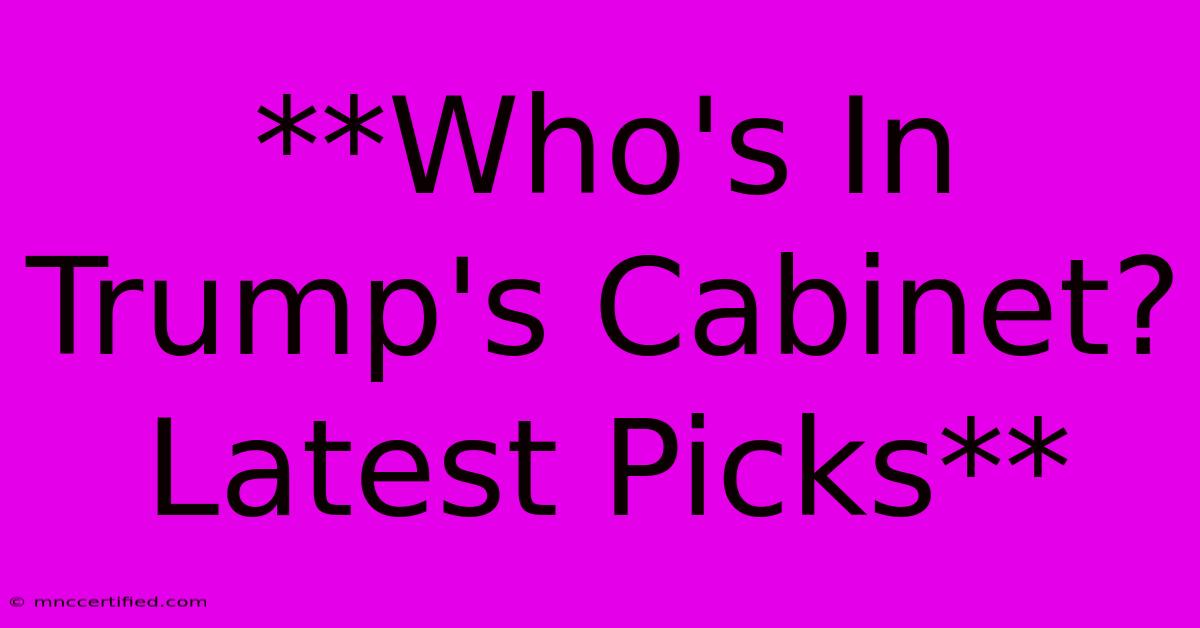**Who's In Trump's Cabinet? Latest Picks**

Table of Contents
Who's in Trump's Cabinet? A Look at the Key Appointments and Their Impact
Donald Trump's cabinet selections generated significant interest and debate during his presidency (2017-2021). Understanding who served in key roles and their backgrounds offers valuable insight into the administration's policies and priorities. This article will explore the key figures who comprised Trump's cabinet, focusing on their appointments and the lasting impact of their tenures.
Key Cabinet Positions and Appointees
Trump's cabinet appointments often deviated from traditional political norms, sparking considerable discussion and controversy. Here's a look at some of the most prominent positions and the individuals who filled them:
Secretary of State: Rex Tillerson & Mike Pompeo
- Rex Tillerson (2017-2018): A former ExxonMobil CEO, Tillerson's appointment signaled a focus on business-oriented diplomacy. His tenure was marked by a more pragmatic approach to foreign policy, but ultimately ended in disagreement with the President.
- Mike Pompeo (2018-2021): Pompeo, a former congressman and CIA director, took a much more assertive and hawkish stance, particularly towards Iran and China. His appointment represented a shift towards a more explicitly confrontational foreign policy.
Secretary of the Treasury: Steven Mnuchin
- Steven Mnuchin (2017-2021): A former Goldman Sachs executive and Hollywood financier, Mnuchin oversaw the implementation of significant tax cuts and played a key role in the administration's economic policy. His background fueled debates about conflicts of interest and the influence of Wall Street.
Secretary of Defense: James Mattis & Mark Esper
- James Mattis (2017-2018): A highly respected retired Marine Corps general, Mattis brought significant military expertise to the role. His tenure was characterized by a more cautious approach to military intervention compared to some within the administration.
- Mark Esper (2019-2020): Esper, a former Army officer and lobbyist, succeeded Mattis and faced challenges navigating the complexities of national security policy amidst increasing political polarization.
Attorney General: Jeff Sessions & William Barr
- Jeff Sessions (2017-2018): Sessions, a former Alabama senator, prioritized a tough-on-crime approach. His recusal from the Russia investigation led to considerable controversy.
- William Barr (2019-2021): Barr's appointment generated significant debate, particularly concerning his handling of the Mueller report and his relationship with the President. His tenure was marked by disagreements with career Justice Department officials.
Understanding the Impact
Trump's cabinet choices reflected his populist platform and often prioritized loyalty and experience outside traditional government circles. The appointees' backgrounds and policy decisions significantly influenced the direction of the administration across various sectors, including:
- Economic Policy: Tax cuts, deregulation, and trade negotiations were heavily shaped by the Treasury Secretary and other cabinet members.
- Foreign Policy: Relationships with key allies and adversaries were impacted by the Secretaries of State and Defense.
- Domestic Policy: The Attorneys General and other cabinet officials played critical roles in shaping immigration policy, healthcare debates, and environmental regulations.
Beyond the Headlines: A Deeper Dive
To gain a more comprehensive understanding, researchers and news consumers should explore individual biographies of each cabinet member, examine official government documents related to their decisions, and consider diverse perspectives and analyses from reputable news sources and academic journals. This deeper dive provides a fuller picture of the complexities and lasting impact of Trump's cabinet selections.
Conclusion
The composition of Donald Trump's cabinet remains a subject of ongoing analysis and debate. Examining the individuals appointed to key positions and their policy actions provides crucial context for understanding the significant events and changes that characterized his presidency. Understanding the motivations behind these appointments and their consequences is vital for informed discussion about the future of American politics.

Thank you for visiting our website wich cover about **Who's In Trump's Cabinet? Latest Picks**. We hope the information provided has been useful to you. Feel free to contact us if you have any questions or need further assistance. See you next time and dont miss to bookmark.
Featured Posts
-
Heston Blumenthal Wifes Action A Revelation
Nov 14, 2024
-
Matt Gaetz Exits Congress For Attorney Position
Nov 14, 2024
-
Two Sisters John Lewis Christmas Advert Story
Nov 14, 2024
-
Hegseth For Defense Pentagon In Disbelief
Nov 14, 2024
-
Lakers Win Close Game Against Grizzlies Nov 13
Nov 14, 2024